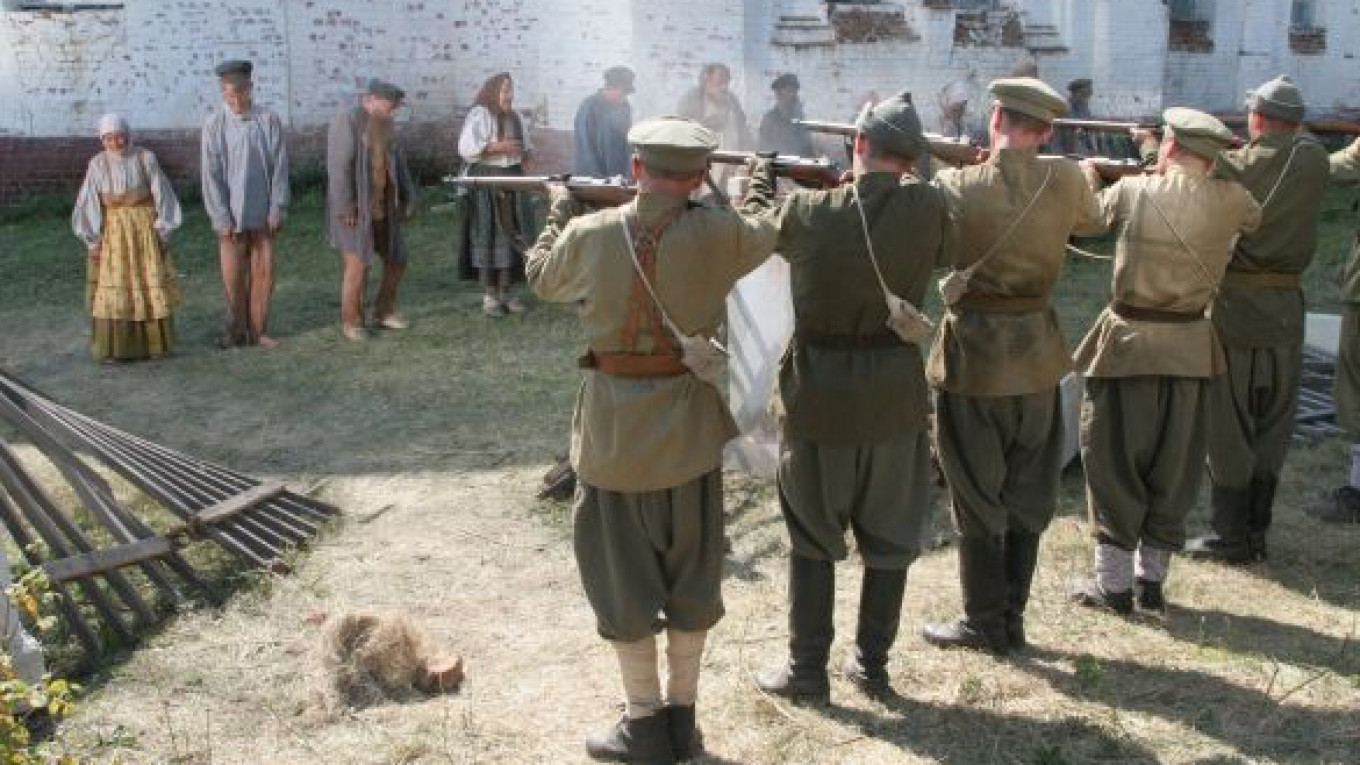Veteran director Andrei Smirnov has returned to the screen after nigh on three decades with a look at a dark period in Russia’s history, a peasant rebellion that was brutally crushed by the Bolsheviks after the Revolution.
“Zhila-Byla Odna Baba,” or “Once Upon a Time There Lived a Woman,” follows a simple peasant woman in the Tambov region in 1920, whose life is turned upside down by the Revolution and the subsequent uprising.
Smirnov, 70, said he had long wanted to make a film about the human effects of the Revolution.
“It was natural for me to look at the topic of the village, the death of the Russian village, the revolutionary era and the Civil War,” Smirnov said at a recent news conference about the release of his much-anticipated film.
The revolt in the film is based on a real insurrection in 1920-21 that was sparked by the forced confiscation of grain by Bolshevik forces. It was one of the most well-known rebellions against the Soviets and was cruelly crushed. Thousands died in the conflict, and chemical weapons were used at one point by the Bolsheviks, the first time a state ever used such weapons against its own people.
Smirnov focuses his plot on the story of Varvara, played by the young actress Darya Y?µkamasova, who survives rape and the death of loved ones.
“The story is shown through the eyes of a simple woman who doesn’t understand who is Red and who is Green, but who like every woman gives undying support to her family and children,” Smirnov said.
Critics have seen Varvara as a symbol for Russia itself.
“I wanted the viewer not only to cry or to laugh, but to think about the fate of Russia,” Smirnov said.
Rock singer and public activist Yury Shevchuk also stars as member of the peasant army.
Smirnov is most famous for his 1971 film “Belorussky Vokzal,” or “Belorussky Station,” a touching drama about several World War II veterans meeting for a reunion after many years of not seeing one another.
He directed only two more films after that hit, turning to acting and screenwriting for the last three decades. He most recently played one of the leading roles in Andrei Zvyagintsev’s art-house hit “Elena.”
Smirnov said in an interview with Afisha magazine that he gave up directing because of problems with censorship.
The film has had mixed reviews, with some comparing the director’s offering to Nikita Mikhalkov’s much-criticized sequels to the Oscar-winning “Burnt by the Sun.”
Kommersant film critic Mikhail Trofimenkov said the film showed that Smirnov had lost none of his directing skill, but called the film artificial propaganda against communism.
Like Mikhalkov’s films, “Zhila-Byla Odna Baba” received lavish state backing and support by state-friendly businessmen. Billionaire Viktor Vekselberg and the Kremlin’s chief ideologist Vladislav Surkov both backed the film, Smirnov said, and bizarrely, the names of Defense Minister Anatoly Serdyukov, Rusnano head Anatoly Chubais and Russian Railways chief Vladimir Yakima are all thanked in the film’s credits.
So far the film, which cost more than $6 million to make, looks unlikely to turn a profit with less than $500,000 worth of tickets sold since it debuted earlier this month.
A Message from The Moscow Times:
Dear readers,
We are facing unprecedented challenges. Russia's Prosecutor General's Office has designated The Moscow Times as an "undesirable" organization, criminalizing our work and putting our staff at risk of prosecution. This follows our earlier unjust labeling as a "foreign agent."
These actions are direct attempts to silence independent journalism in Russia. The authorities claim our work "discredits the decisions of the Russian leadership." We see things differently: we strive to provide accurate, unbiased reporting on Russia.
We, the journalists of The Moscow Times, refuse to be silenced. But to continue our work, we need your help.
Your support, no matter how small, makes a world of difference. If you can, please support us monthly starting from just $2. It's quick to set up, and every contribution makes a significant impact.
By supporting The Moscow Times, you're defending open, independent journalism in the face of repression. Thank you for standing with us.
Remind me later.


